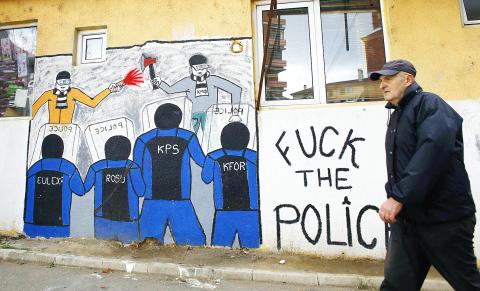Outbreaks of violence and a low turnout marred key local elections in Kosovo on Sunday, the first in which ethnic Serbs have been encouraged to vote since the territory proclaimed independence in 2008.
One woman was seriously injured when masked extremists stormed a polling station, attacking voters and election commissioners and destroying ballot boxes in the ethnically divided town of Kosovska Mitrovica, Belgrade-backed Serb mayoral candidate Krstimir Pantic told reporters.
Polling stations in the Serb-run northern part of the town closed an hour before the official close of voting at 6pm as a result of the violence.

Photo: Reuters
There were also outbreaks of violence at several other polling stations, candidate Oliver Ivanovic said.
“The vote was interrupted by violence... it is clear that the elections in northern Kosovska Mitrovica have failed and probably will be declared invalid,” Ivanovic said.
The Organization for Security and Co-operation in Europe, which had a key role in organizing the polls in northern Kosovo, said it was withdrawing its staff from the town.
“The security of our staff was compromised and we decided to remove all our staff,” spokesman Nikola Gaon said in Pristina.
The election of deputies and mayors in 36 Kosovo municipalities is being watched closely by Brussels as a test of relations between Pristina and Belgrade after a historic EU-brokered deal in April to normalize ties.
Serbia rejects Kosovo’s independence, but has openly backed the polls, urging the minority Serb community in the breakaway province to vote and have their say in Pristina-run institutions.
The participation of Serb voters is seen as crucial to the poll’s success. There are about 120,000 ethnic Serbs living in Kosovo, about 40,000 of whom live in the north, where they make up the majority and enjoy control over some public institutions.
Many Serbs have expressed concern that voting in the election would give legitimacy to the Kosovo government.
Serb hardliners in the north have actively campaigned for a boycott of the polls and there were reports of voter intimidation.
“Some groups are not allowing voters to cast their ballots,” Valdete Daka of Kosovo’s central election commission said.
One supporter of the boycott, Igor Vojinovic, said refusing to vote was “the only way to save the Serb state” in northern Kosovo.
However, Serbian Prime Minister Ivica Dacic warned that “all calls for boycott and threats are endangering the Serbs’ survival in Kosovo.”
Kosovo, the territory which sparked a war between Serb forces and ethnic Albanian rebels in 1998-1999, remains the main stumbling block to Serbia’s bid to join the EU.
The April deal with Pristina helped Serbia secure the green light to begin membership talks with Brussels and holding up its end of the accord is vital for Belgrade.
Despite Belgrade’s vocal support for the polls, the boycott campaign seemed to have had an effect — the election commission said turnout among Serb voters in the north was only about 13 percent.
Preliminary results of the poll are expected tomorrow.

Asian perspectives of the US have shifted from a country once perceived as a force of “moral legitimacy” to something akin to “a landlord seeking rent,” Singaporean Minister for Defence Ng Eng Hen (黃永宏) said on the sidelines of an international security meeting. Ng said in a round-table discussion at the Munich Security Conference in Germany that assumptions undertaken in the years after the end of World War II have fundamentally changed. One example is that from the time of former US president John F. Kennedy’s inaugural address more than 60 years ago, the image of the US was of a country

BLIND COST CUTTING: A DOGE push to lay off 2,000 energy department workers resulted in hundreds of staff at a nuclear security agency being fired — then ‘unfired’ US President Donald Trump’s administration has halted the firings of hundreds of federal employees who were tasked with working on the nation’s nuclear weapons programs, in an about-face that has left workers confused and experts cautioning that the Department of Government Efficiency’s (DOGE’s) blind cost cutting would put communities at risk. Three US officials who spoke to The Associated Press said up to 350 employees at the National Nuclear Security Administration (NNSA) were abruptly laid off late on Thursday, with some losing access to e-mail before they’d learned they were fired, only to try to enter their offices on Friday morning

STEADFAST DART: The six-week exercise, which involves about 10,000 troops from nine nations, focuses on rapid deployment scenarios and multidomain operations NATO is testing its ability to rapidly deploy across eastern Europe — without direct US assistance — as Washington shifts its approach toward European defense and the war in Ukraine. The six-week Steadfast Dart 2025 exercises across Bulgaria, Romania and Greece are taking place as Russia’s invasion of Ukraine approaches the three-year mark. They involve about 10,000 troops from nine nations and represent the largest NATO operation planned this year. The US absence from the exercises comes as European nations scramble to build greater military self-sufficiency over their concerns about the commitment of US President Donald Trump’s administration to common defense and

Cook Islands officials yesterday said they had discussed seabed minerals research with China as the small Pacific island mulls deep-sea mining of its waters. The self-governing country of 17,000 people — a former colony of close partner New Zealand — has licensed three companies to explore the seabed for nodules rich in metals such as nickel and cobalt, which are used in electric vehicle (EV) batteries. Despite issuing the five-year exploration licenses in 2022, the Cook Islands government said it would not decide whether to harvest the potato-sized nodules until it has assessed environmental and other impacts. Cook Islands Prime Minister Mark Brown